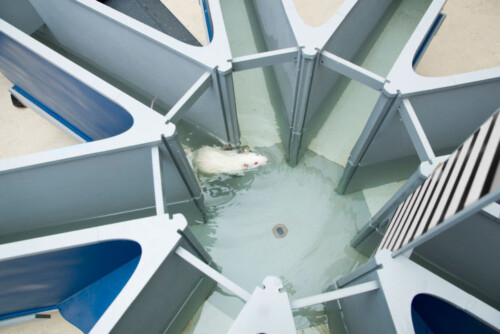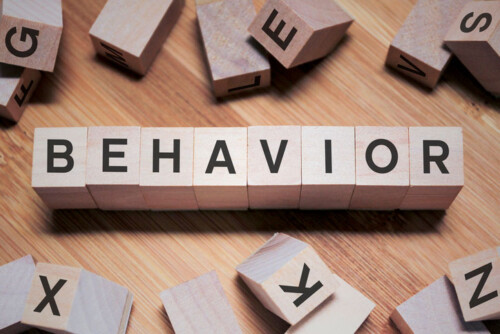Want to Learn More About Behavioral Psychology Degree Requirements and Jobs?
 If the picture in your head of what psychology is all about involves watching rats run around in clever mazes all day long, you’ve come to the right place: that’s exactly what people imagine behavioral psychology is all about.
If the picture in your head of what psychology is all about involves watching rats run around in clever mazes all day long, you’ve come to the right place: that’s exactly what people imagine behavioral psychology is all about.
But that’s not fair to either the rats or behavioral psychologists. The thing is, all behaviors are important in psychology. Mental health problems emerge as problematic behaviors. The habits of everyday life, what you do when you get up, how you react to problems at work… these are all behaviors that are within the scope of behavioral psychology.
Behavioral psychology is the study of how all human behaviors come about and how to shape them into healthier, more productive behaviors through rigorous, proven scientific techniques.
Behavioral psychologists aren’t going to put you on a couch and do any deep dives into your relationship with your father. They are all about the here and now. What is the situation that makes you react with anger when the garbage truck bumps your mailbox, and how you can use behavioral techniques to diminish that response? What environmental stimuli cause an autistic child to begin lashing out, and how can caregivers react to prevent that response in the future?
When you look around, everything is a behavior. And if you are trained as a behavioral psychologist, you have the toolbox to help interpret and change all of those behaviors. And that toolbox has tools in it that are important in fields ranging from animal training to consumer marketing to counseling ex-cons on their reentry to society.
Behavioral Psychology Careers: What Does a Behavioral Psychologist Do?
Behavioral psychologists have a different way of seeing the world. It’s a straightforward model that cuts out a lot of the complexity of traditional Freudian or cognitive theories of human psychology. Behaviorism boils human thought down to human action: observable behaviors. While behaviorism doesn’t mean that people don’t think or have active internal dialogs, it cuts those out of the loop of psychological treatments by saying that only our actual behaviors are problematic or can be affected by treatment.
This makes behavioral psychology as straightforward as ABC:
- Antecedent - An environmental stimulus that creates a response in the form of:
- Behavior - The action or reaction that emerges from a person as the result of a perceived antecedent and:
- Consequence - A positive or negative response to the behavior that either reinforces, or encourages, future performance of that behavior, or discourages the reoccurrence of that behavior.
Although behavioral psychologists are all about those ABCs, that doesn’t mean that the field is simple. In fact, the process of sorting out complex stimuli and determining the consequences individuals experience takes a lot of training, experimentation, and analysis. Behaviorists are known as some of the foremost researchers in the entire field of psychology.
As a consequence, though, they have some of the best empirical evidence about the strength of their approach.
Behavioral psychology has emerged as the only scientifically-proven effective treatment for autism, and is a recommended treatment for everything from ADHD (Attention Deficit Hyperactive Disorder) to PTSD (Post-Traumatic Stress Disorder).
Developing the expertise to work as a behavioral psychologist takes significant training, though. You’ll need to find the right degree from the right school to make it in this field.
LEARN MORE ABOUT BECOMING A PSYCHOLOGIST
What is behavioral psychology?
Behavioral psychology is a branch of the field that analyzes human behavior and treats mental issues based on the theory that all behaviors are the result of environmental stimuli and positive or negative reinforcement.
Behaviorism is a major force in understanding modern psychological theory, so all psychologists study behavioral psychology to some extent, even if they don’t specialize in the field.
What does a behavioral psychologist focus on?
Behavioral psychologists focus on the study, analysis, and treatment of psychological conditions from the behavioral perspective. This school of thought suggests that all behaviors—and all problematic mental health conditions—can be changed through the application of classical or operant conditioning or by adjusting the stimuli patients experience.
Though experimentation and analysis, behavioral psychologists study the stimuli that lead to behaviors, along with the consequences that can be used to reinforce positive behaviors or extinguish negative ones.
Earning a Behavioral Psychology Degree
 Your psychology degree path will be shaped by whether or not you plan to practice as a clinical psychologist or in other direct patient treatment roles.
Your psychology degree path will be shaped by whether or not you plan to practice as a clinical psychologist or in other direct patient treatment roles.
That’s because professions like clinical psychology, school psychology, counseling, and applied behavior analysis therapy are all regulated in most states, and always have specific degree requirements that need to be met for licensure.
To practice as a clinical psychologist in any state you’ll need to have a full doctorate degree to your name. That involves intensive schooling of over a decade together with a lot of hands-on experience along the way.
ABA therapists and school psychologists only have to earn a master’s degree, however. And you can also find therapy assistant jobs that require only a bachelor’s degree.
There are many options in the workforce for behavioral psychologist jobs that don’t involve direct patient treatment, however. Those don’t need licensure and the degree requirements are driven by the market, with a master’s being the most common requirement but bachelor’s degrees sometimes getting you in the door.
For the most part, you can expect to find these degrees in psychology at every level, with concentrations in behavioral science or behavioral psychology. But schools also offer degrees in behavioral science itself, or in applied behavior analysis. The difference is all about emphasis. In a psychology degree program, a lot of your basic studies will be the same kind of training that any psychologist gets in therapy and mental health diagnosis.
What kind of courses will you study in behavioral psychology programs?
Behavioralists are firm believers in the role of experimentation and analysis, not just as a pure research play, but as a part of treatment itself. That means you can expect a lot of classes in statistical and quantitative analysis, experimental design, and research methodology.
You will also get a strong footing in the history of behavioral psychology as one of the foundations of modern psychological thought, going all the way back to Pavlov and moving up through Skinner and beyond. You’ll see how groundbreaking studies in conditioning have shaped many elements of modern society, from child-raising to the prison system.
You’ll also put a lot of time into studying ethics and professional issues in a behavioral psychology degree program. The dark side of behavioral psychology have been studies that were conducted in negative reinforcement, morally questionable experiments that continue to hang over the field. With that in mind, modern behavioral psychology degrees double down on ethics and the moral founding of treatment and experimental design.
Behavioral Psychology Jobs and Salaries
 Because you can find behavioral psychology careers at many different levels of education and in many different fields, you’ll notice there are a wide range of salaries available.
Because you can find behavioral psychology careers at many different levels of education and in many different fields, you’ll notice there are a wide range of salaries available.
With a bachelor’s degree in the field, you can become a psychiatric aide, registered behavior technician, or assistant behavioral analyst. These entry-level behavioral psychology jobs involve a lot of direct client interaction that don’t usually stipulate meeting licensure requirements. And of course, you can find many jobs without client contact in behavioral psychology, like marketing or community health, with just a bachelor’s.
According to the Bureau of Labor Statistics, psychiatric aides earned an average annual salary of $38,620 in 2022. Those in the top ten percent of the field could earn more than $52,050.
Psychologists, on the other hand, usually have more training and can expect much higher salaries. The median for all psychologists in salary for 2021 was $81,040 per year, with the top ten percent making over $133,890. Clinical and counseling psychologists, who hold doctorates and can specialize in behavioral psychology, are in a sub-category of that profession and had a median salary of $90,130 in May 2022. School psychologists earned $87,550 on average at that time, but in many places, they only need to have Master’s degrees to qualify for employment.
That pattern, of more education leading to higher behavioral psychology salaries, is true throughout the field. But behavioral psychology has applications in so many different industries that you can always roll the dice and aim for more… landing a behavioral psychology job at a hot internet startup analyzing user behaviors in an app or website could be a ticket to crazy big money. There are plenty of well-paying behavioral psychology jobs, and all of them are exciting.
2022 US Bureau of Labor Statistics job market trends and salary figures for psychologists, clinical psychologists, school psychologists, and psychiatric aides are based on national data, not school-specific information. Conditions in your area may vary. Data accessed July 2023.




